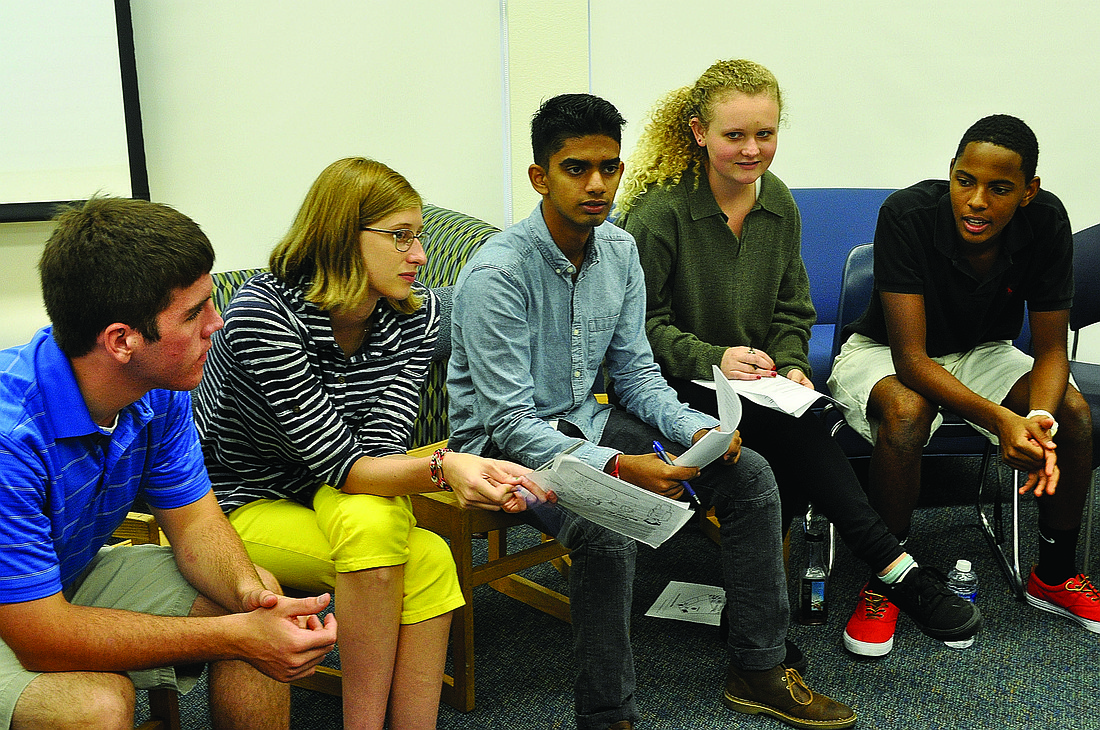- April 24, 2024
-
-
Loading

Loading

Janum Trivedi, an Out-of-Door Academy senior, sat at the front of his seat and leaned forward, vouching for Fredric, a 22-year-old Tutsi herder who recently migrated from Uganda and wants to claim the land he left behind.
Trivedi, playing Fredric, a character from a case study based on a real person, negotiated for the herder’s fate like it was his own — knowing well the implications.
Students at ODA’s Upper School Lakewood Ranch campus reached outside their classroom wall’s during their Raising Global IQ workshop Oct. 2.
Carl Hobert, a Boston University professor, led a one-day workshop, called “Rwanda: One Village, Six People,” with both ODA seniors and students from Booker High School.
Kenneth Summers, an ODA teacher who teaches “Issues in Contemporary Society,” invited Hobert and Booker students to join his class for the workshop.
It was the fourth such workshop Summers has organized. Hobert, also the founder of Axis of Hope, a nonprofit he founded that teaches global citizenship to youth, has managed each of them.
But it was the first time Booker students participated — an outreach by Summers to introduce his class to people they didn’t know.
The students sat in the library, in chairs forming a circle.
There were three sets of circles.
Role-playing a case study based on real-world events, the students assumed the identity of a specific character.
Students played one of six roles, based on real-life: Bernadette, Frederic, Ancille, Joseph, Charles and Perpetune.
Students negotiated with other characters to reach an agreement on the division of a contested area of Rwanda, near its borders with Uganda and the Democratic Republic of the Congo.
The case study takes place in present-day Rwanda, the east African state still recovering from the 1994 genocide.
Students read background on the case study about two weeks before the event.
Set during a complex time in which the current president, Paul Kagame, pushes national development and education but faces allegations of political repression, the case involves ownership of a contested piece of land in the Gisenyi Province of northern Rwanda.
A wave of Hutus — the historical majority class to the minority Tutsis — has returned to Rwanda after the genocide.
Every few minutes, the students would switch circles and negotiate with new people — from both ODA and Booker — about a different aspect of the dispute.
“At ODA, we know each other’s views before we walk in,” said Caroline Whitten, an ODA senior. “We know other students’ political beliefs. We know each other outside the classroom. We know what they will bring to the table. Here, we had to role play it and advocate for our character to people (from Booker) we’re not familiar with.”
In between each negotiating session, Hobert, often raising his voice and waving his arms, gave advice in diplomacy.
Hobert — who has traveled to Chad, Haiti and Rwanda with Axis of Hope — formed his hands into a “T,” like a timeout, explaining it signifies the most important diplomatic element: trust.
“When you go to somebody and say something, you better go to somebody else and say the same thing,” Hobert said. “You know what happens when you say something else? You shatter the trust.”
At one point, he squatted to get eye-level with a student sitting in a chair. Hobert told the students good negotiation comes from seeing things at your counterpart’s level.
Trivedi, the ODA senior playing Fredric, claims Bernadette’s land as his own.
His family left the land during the 1962 Hutu uprising, and he possesses his father’s original title to the property.
Trivedi, like most, found it difficult to stay quiet while others shouted competing opinions.
But, as he learned, waiting out the chaos made his point settle in that much more.
In round two of negotiations, he told Joseph, whose job is to settle land disputes, that he would be willing to share half the land with Bernadette.
“It is important to get the opportunity to learn about something that we’re not that familiar about,” Trivedi said. “Sometimes we get too involved in our local community and forget there’s a larger world out there. It makes it personal when you have to assume a role and maintain that role even if you don’t agree with its world view.”
Hobert even arranged a Skype conversation between the students and Mathilde Mukantabana, the ambassador of Rwanda to the United States.
The ambassador took questions from the students.
Jillian James, a Booker student, asked Mukantabana what it required for her to assume such a powerful position as a woman.
“Women haven’t had it handed to them,” the ambassador replied through the computer. “There were no women in power in 1994. We had to prove ourselves. We are at a very exciting place in Rwandan society because we feel empowered.”